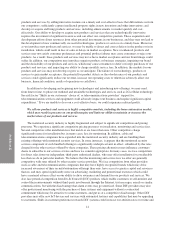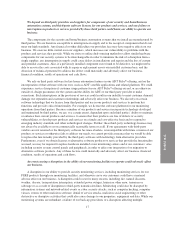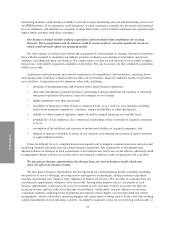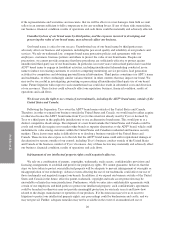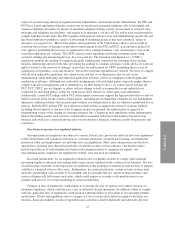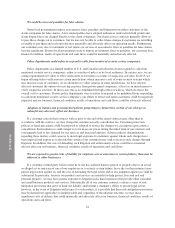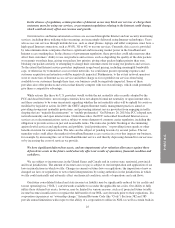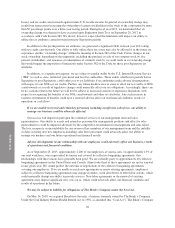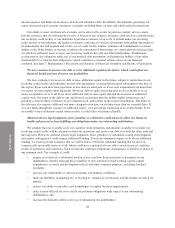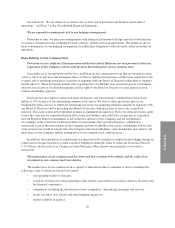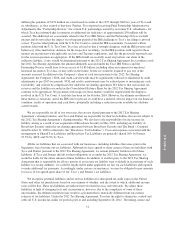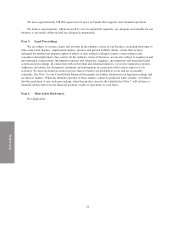ADT 2015 Annual Report Download - page 98
Download and view the complete annual report
Please find page 98 of the 2015 ADT annual report below. You can navigate through the pages in the report by either clicking on the pages listed below, or by using the keyword search tool below to find specific information within the annual report.
FORM 10-K
We could be assessed penalties for false alarms.
Some local governments impose assessments, fines, penalties and limitations on either customers or the
alarm companies for false alarms. A few municipalities have adopted ordinances under which both permit and
alarm dispatch fees are charged directly to the alarm companies. Our alarm service contracts generally allow us
to pass these charges on to customers, but we may not be able to collect these charges if customers are unwilling
or unable to pay them and such outcome may materially and adversely affect our operating results. Furthermore,
our customers may elect to terminate or not renew our services if assessments, fines or penalties for false alarms
become significant. If more local governments were to impose assessments, fines or penalties, our customer base,
financial condition, results of operations and cash flows could be materially and adversely affected.
Police departments could refuse to respond to calls from monitored security service companies.
Police departments in a limited number of U.S. and Canadian jurisdictions do not respond to calls from
monitored security service companies, either as a matter of policy or by local ordinance. In certain cases, we are
seeing requirements for video or other verification or eyewitness accounts of suspicious activities. In 2015, we
began offering video verification in certain jurisdictions which increases costs of some security systems which
may increase costs to customers. As an alternative to video cameras in some jurisdictions, we have offered
affected customers the option of receiving response from private guard companies, at least as an initial means to
verify suspicious activities. In most cases this is accomplished through contracts with us, which increases the
overall cost to customers. If more police departments were to refuse to respond or be prohibited from responding
to calls from monitored security service companies, our ability to attract and retain customers could be negatively
impacted and our business, financial condition, results of operations and cash flows could be adversely affected.
Adoption of statutes and governmental policies purporting to characterize certain of our charges as
unlawful may adversely affect our business.
If a customer cancels their contract with us prior to the end of the initial contract term, other than in
accordance with the contract, we may charge the customer an early cancellation fee. Consumer protection
policies or legal precedents could be proposed or adopted to restrict the charges we can impose upon contract
cancellation. Such initiatives could compel us to increase our prices during the initial term of our contracts and
consequently lead to less demand for our services and increased attrition. Adverse judicial determinations
regarding these matters could cause us to incur legal exposure to customers against whom such charges have
been imposed and expose us to the risk that certain of our customers may seek to recover such charges through
litigation. In addition, the costs of defending such litigation and enforcement actions could have a material
adverse effect on our business, financial condition, results of operations and cash flows.
We are exposed to greater risks of liability for employee acts or omissions or system failures, than may be
inherent in other businesses.
If a customer or third party believes that he or she has suffered harm to person or property due to an actual
or alleged act or omission of one of our employees or a security system failure, he or she (or their insurers) may
pursue legal action against us, and the cost of defending the legal action and of any judgment against us could be
substantial. In particular, because our products and services are intended to help protect lives and real and
personal property, we may have greater exposure to litigation risks than businesses that provide other consumer
and small business products and services. Substantially all of our customer contracts contain a series of risk-
mitigation provisions that serve to limit our liability and/or limit a claimant’s ability to pursue legal action;
however, in the event of litigation with respect to such matters, it is possible that these risk-mitigation provisions
may be deemed not applicable or unenforceable and, regardless of the ultimate outcome, we may incur
significant costs of defense that could materially and adversely affect our business, financial condition, results of
operations and cash flows.
24


